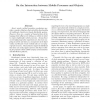Free Online Productivity Tools
i2Speak
i2Symbol
i2OCR
iTex2Img
iWeb2Print
iWeb2Shot
i2Type
iPdf2Split
iPdf2Merge
i2Bopomofo
i2Arabic
i2Style
i2Image
i2PDF
iLatex2Rtf
Sci2ools
133
click to vote
HCW
1998
IEEE
1998
IEEE
On the Interaction between Mobile Processes and Objects
Java's remote method invocation mechanism provides a number of features that extend the functionality of traditional client server-based distributed systems. However, there are a number of characteristics of the language that in uence its utility as a vehicle in which to express lightweight mobile processes. Among these are its highly imperative sequential core, the close coupling of control and state as a consequence of its object model, and the fact remote method calls are not properly tail-recursive. These features impact the likelihood that Java can easily support process and object mobility for programs which exhibit complex communication and distribution patterns.
Distributed And Parallel Computing | Fact Remote Method | HCW 1998 | Remote Method Invocation | Server-based Distributed Systems |
Related Content
| Added | 04 Aug 2010 |
| Updated | 04 Aug 2010 |
| Type | Conference |
| Year | 1998 |
| Where | HCW |
| Authors | Suresh Jagannathan, Richard Kelsey |
Comments (0)

